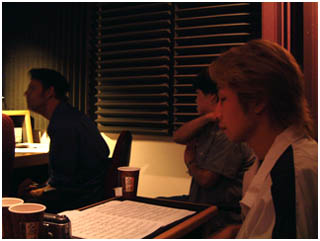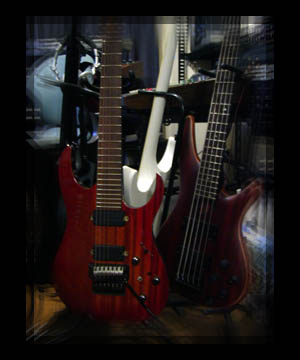Akira Yamaoka on Music in Silent Hill 3Date published: 2003 About Sound of Silent Hill
Designing sound when it is interactive, I would say this is most creative work that you cannot see in other fields. I consider that everything that has to do with sound such as "music", "sound effect", and "recitation" needs to be thought in the same level and be created. The sound of Silent Hill comes from this aspect. Since I work on all the sounds in the game, including sound effects and the music, the work load is enormous. However, to keep the atmosphere of Silent Hill, this is the only way to do it. In fact, it helps me become more creative. I suppose "industrial noise" would fall into this. To create this sound, there is no way of explaining of how to do this to someone else (laugh). By the way, I pay special attention to harmony in the sound design of Silent Hill. It seems that there are lots of "video game music" or "sound effects" that explain pictures on screen, I avoid that. What I would love to express is the harmony of picture and sound, and its the results. However, to do so, it can be done because we are committed to go in the same direction as the rest of the Silent Hill project staff. The end result should be an enjoyable experience for all. About Song of Silent HillIn Silent Hill 3, I have always thought of having songs with vocals included. It's not particularly new in games, but it is new in the Silent Hill world. Yet, I think that a song, after all, is part of the sound effects. It is just meant to widen the value and fun part of a game. I guess you can say that video game music is sound effect. Thus, I do not want to have something which is not "effective". Otherwise, it will just be a game with DTM* (laugh). My music inspiration comes from this aspect. I am not just a composer artist nor a music player (laughter). I think there are two types of video game musicians like below:
As to Silent Hill 3, I really spent a great deal of time, from picking singers, to composing, and recording the songs. In this Silent Hill, there isn't an easy way where you are simply given the music and have it incorporated. You must be in control of the all aspects such as music creation, music structure, which instruments to be use, etc. Otherwise, the balance will be falling apart. Of course, when it comes to songs, the communication and consensus with the singers must be based upon the game content. I spent most of my time to getting them immersed in the Silent Hill concept. The vocals were recorded in Los Angeles. The project was perfect and I was really satisfied with it. I guess the reason I chose Los Angeles was because I wanted to do something real. "Real" here means to have sound which has thorough communication with the content. It is not "I want to do something with vocal, that's why I do it" (Laugh). From my opinion, I wanted to show in Silent Hill 3 is that "This is the best way to use vocals in a video game". Note: |

 Not limited to Silent Hill, I would say that the sound designing of video games is very peculiar. You must think about the interactivity and furthermore, you must bring about the best performance out of the hardware spec. limitation.
Not limited to Silent Hill, I would say that the sound designing of video games is very peculiar. You must think about the interactivity and furthermore, you must bring about the best performance out of the hardware spec. limitation. I don't want to belong to either of the two types. I regard myself as a game sound designer, and I always try to think about the best sound performance. The conlusion that I have come to is that using vocals would be the best for this project.
I don't want to belong to either of the two types. I regard myself as a game sound designer, and I always try to think about the best sound performance. The conlusion that I have come to is that using vocals would be the best for this project.